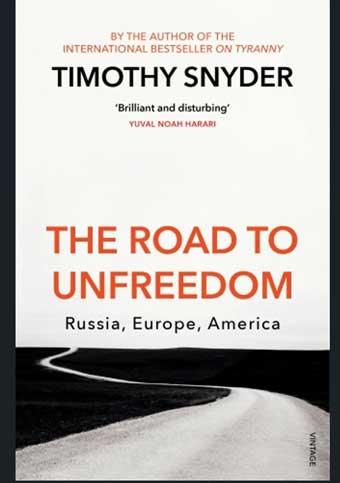Timothy Snyder’s The Road to Unfreedom is not just a book; it’s an air-raid siren blaring through the complacent fog of modern politics. This is a formidable, deeply unsettling, and morally urgent work that connects the dots from dusty, forgotten fascist texts to the cyber-attacks that flicker across our phone screens. Snyder, a preeminent historian of Eastern European bloodlands, uses his expertise to construct a terrifyingly coherent theory of how democracies die, not with a bang, but a slow, deliberate poisoning of truth.
The Grand Theory: From Inevitability to Eternity
Snyder’s masterstroke is his philosophical framework. He argues that the post-Cold War “politics of inevitability”, the smug assumption that liberal democracy was the final, unbeatable endpoint of history—has collapsed. In its place, we now face a “politics of eternity.” This isn’t a forward-looking ideology, but a sinister feedback loop. Eternity politics, peddled masterfully by the Kremlin, traps nations in a cycle of nostalgic myth, perpetual victimhood, and manufactured external threats. It’s a drug that kills hope and justifies strongman rule. Snyder doesn’t just name this phenomenon; he chills the reader by tracing its intellectual bloodline directly to Ivan Ilyin, a resurrected Russian fascist philosopher whose writings on a mystical Christian nation under siege have become, as Snyder proves, a veritable blueprint for Vladimir Putin’s inner circle.

The Battlefield: Ukraine as Hypertypical
The heart of the book, and its most gripping section, is Ukraine. Snyder positions the 2014 Maidan Revolution not as a distant regional conflict, but as the hyper-typical battleground in this new ideological world war. He paints a vivid picture: peaceful protesters, inspired by the hope of a European future, are met with sniper fire ordered by a president, Viktor Yanukovych, acting at Putin’s behest. This wasn’t just a protest; it was a mature, civic society transcending language and ethnicity, choosing facts, dignity, and integration over the cynical fictions of the Russian world. Snyder brilliantly frames Ukraine’s fight as a defense of reality itself against an empire of lies.
The Contagion: From Moscow to Main Street
The book’s scope is breathtaking as Snyder details how the Kremlin’s “weapons of the weak”, a relentless firehose of disinformation on outlets like Russia Today, sophisticated cyber-attacks, and the strategic funding of European far-right movements, were deployed to destabilize the West.
He eviscerates the “fable of the wise nation,” the cozy story that Europe gently learned from its wars and chose integration. Instead, Snyder argues the EU was a desperate rescue mission for failed empires. His devastating conclusion? A country like the UK leaving the EU doesn’t become a proud, independent nation; it degrades into just another “remnant state,” a peer to Putin’s Russia, left behind by history.
Then, he turns to America. The chapter on the 2016 election reads like a political thriller, but one grounded in grim fact. Snyder lays out the “shockingly intimate connections”: from Paul Manafort cashing checks from pro-Russian oligarchs to Donald Trump’s own financial dependencies on Russian capital. He argues this was not mere meddling, but an “unprecedented” collusion where a presidential campaign was “so closely bound to a foreign power.”
The Unresolved Tension: The Book’s Beating Heart
This is where the review must grapple with the book’s most provocative and debated tension. Does Snyder believe America was hijacked by a Russian plot? Or was it already traveling a parallel “road to unfreedom”?
At times, he seems to lean toward the former, perhaps ironically externalizing blame in a way that mirrors the Russian “cult of innocence” he critiques. But the more profound, and ultimately more convincing, argument is the latter. Snyder’s brilliant synthesis of the converging paths of Russia and America, the “unfettered American capitalism” colluding with “kleptocratic Russian authoritarianism,” the massive inequalities creating insecure, angry populations, and the personalization of politics around a single, emotional leader, is the book’s true, terrifying payoff. It suggests that Russia didn’t create the disease; it simply exploited a body already fighting a grave illness.
The Road to Unfreedom is a dense, demanding, and indispensable read. While one might wish for a deeper analysis of whether cyberwarfare is truly a game-changer or just a potent nuisance, Snyder’s work is a monumental achievement. It gives us the vocabulary: “politics of eternity,” “the fable of the wise nation”, to understand the chaos. It is a chilling, detailed, and passionately argued field guide to the resistance, reminding us that freedom is not a passive state but a conscious, daily choice to defend reality over comforting lies. Read it, and you will never look at the news the same way again.


